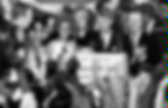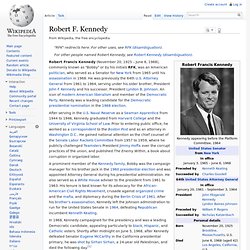

Sen. Robert F. Kennedy Interview- Civil Unrest, Vietnam (Merv Griffin Show 1967) Robert F. Kennedy- Wikipedia Page. After serving in the U.S.

Naval Reserve as a Seaman Apprentice from 1944 to 1946, Kennedy graduated from Harvard College and the University of Virginia School of Law. Prior to entering public office, he worked as a correspondent to the Boston Post and as an attorney in Washington D.C.. He gained national attention as the chief counsel of the Senate Labor Rackets Committee from 1957 to 1959, where he publicly challenged Teamsters President Jimmy Hoffa over the corrupt practices of the union, and published The Enemy Within, a book about corruption in organized labor. In 1968, Kennedy campaigned for the presidency and was a leading Democratic candidate, appealing particularly to black, Hispanic, and Catholic voters. Shortly after midnight on June 5, 1968, after Kennedy defeated Senator Eugene McCarthy in the California presidential primary, he was shot by Sirhan Sirhan, a 24-year old Palestinian, and died the following day.[1] Early life[edit] [edit] Legal career (1951-1960)[edit]
Joseph A. Palermo: Robert F. Kennedy's Contested Legacy. Robert Kennedy's abrupt removal from the nation's political life left in disarray the new Democratic coalition he was working to build.

In August 1968, at the Democratic National Convention in Chicago, the consequences of Kennedy's absence played out. The nationally televised street battles in downtown Chicago between peace demonstrators and police, which spilled onto the convention floor in shoving matches between delegates, had a devastating effect on the party. In 1968, Kennedy was one of the few politicians who could speak the language of the "Old Politics" with machine stalwarts like Chicago Mayor Richard Daley, while still engaging in a constructive dialogue with the anti-war protesters whom Daley's police had beaten outside the convention hall. At the close of the convention, the delegates nominated Hubert Humphrey and flatly rejected a "peace plank" the anti-war wing tried to insert into the party's platform. The Republican Party's candidate, former Vice-President Richard M.
"Summer Home" "Home I Live in All Year" (p268) Barnstable, Massachusetts. History[edit] JFK Monument, Hyannis West Parish Congregational Church Barnstable takes its name from Barnstaple, Devon, England.

The area was first explored by Bartholomew Gosnold in 1602. It was one of the first towns to be settled, one year behind Sandwich, in 1638, and was incorporated in 1639. Soon after the town's founding, agriculture, fishing and salt works became its major industries. By the late 19th century, however, Barnstable was becoming world-renowned as the tourist destination it is to this day. Hyannis Port, Massachusetts. Union Chapel Hyannis Port is a small residential village located in Barnstable, Massachusetts, and Hyannis, Massachusetts.

It is an affluent summer community on Hyannis Harbor 1.4 miles to the south-southwest of Hyannis. RFK Hyannis Home. Kennedy Compound Homes. Kennedy Compound. The Kennedy Compound or Hyannis Port Historic District is the name given to six acres (24,000 m²) of waterfront property on Cape Cod along Nantucket Sound in Hyannis Port, Massachusetts, United States.

It was once the home of American businessman and political figure Joseph P. Kennedy, Sr., his wife Rose, and two of their sons, Jack and Bobby. Their youngest son, Ted lived in his parents' house, and it was his main residence from 1982 until his death in 2009. John used the compound as a base for his successful 1960 U.S. Presidential campaign and later as a summer White House and presidential retreat until his assassination in 1963.
History[edit] In 1926 Joseph P. In 1956, Jack bought a smaller home of his own at 111 Irving Avenue ( WikiMiniAtlas 41°37′51″N 70°18′13″W / 41.6308°N 70.3035°W / 41.6308; -70.3035), not far from his father's home. 41°37′48″N 70°18′11″W / 41.63°N 70.303°W / 41.63; -70.303) adjacent to the other two in 1959 and sold it to Bobby and his wife Ethel in 1961.